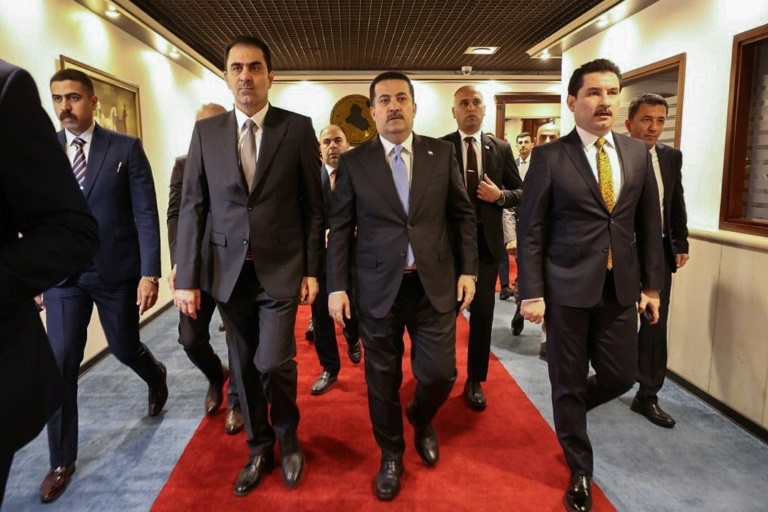Iraq’s new cabinet lacks the support of Sadr

A handout picture released by the Iraqi parliament shows Prime Minister-designate Mohammed Shia al-Sudani at the parliament ahead of a confidence vote on his new government
Baghdad – Iraq’s parliament has approved the government of Prime Minister Mohamed Shia Al-Sudani after more than a year of political paralysis, but the war-ravaged country is far from reaching safe shores.
Al-Sudani now faces the gargantuan task of delivering on pledges to fight corruption and offer job opportunities to the country’s disaffected youth, all while grappling with an unpredictable political opponent.
In a bid to dispel criticism over his pro-Iran political backers in parliament, he has also vowed not to “adopt the polarised politics” of the past that saw Iraq split amongst fiercely rival camps.
But oil-rich Iraq has for years suffered rampant corruption preventing the adequate distribution of funds, and analysts predict no imminent end to the country’s protracted crises.
– Will anything change? –
Al-Sudani and his 21-member cabinet gained the confidence of lawmakers Thursday, in a vote that came more than a year after the country’s last legislative election.
The key step was welcomed by UN chief Antonio Guterres, his spokesman Stephane Dujarric said Friday.
The legislature is dominated by the Coordination Framework, a bloc made up mainly of pro-Iran factions including the former paramilitary Hashed Al-Shaabi.
Also part of the Framework is former premier Nuri Al-Maliki, the longtime rival of firebrand Shiite cleric Moqtada Sadr, who has been involved in heated duels with the bloc all year.
Sadr, who has the ability to mobilise tens of thousands of his supporters with a single message, has already refused to join Al-Sudani’s government.
Under a power-sharing system adopted in Iraq in the aftermath of the 2003 US-led invasion, cabinet posts are shared between Iraq’s ethnic and confessional communities.
As such, 12 ministers are Shiites hailing from the Coordination Framework, six are Sunnis, two are Kurds and one is a Christian, with two other ministries reserved for Kurds yet to be filled.
The new government has come to power “via the same methods as previous governments, with the same blocs and the same parties” that have dominated politics since the 2003 toppling of dictator Saddam Hussein, political analyst Ali Baidar said.
And these parties “view the country’s resources and capabilities as spoils that they can divide between themselves”.
– New elections? –
But the new cabinet lacks the support of a crucial faction — that of Sadr.
Tensions between the Coordination Framework and Sadr came to a head in late August, when more then 30 of the cleric’s supporters were killed in clashes with Iran-backed factions and the army.
Sadr has repeatedly demanded early elections, but the Framework sought to ensure that a government was in place before any polls were held.
Al-Sudani has promised to “modify the election law within three months and organise elections within a year”, in an apparent response to Sadr’s demands.
Granting concessions to the Sadrists could guarantee a “relative stability”, according to Ihsan Al-Shammari, a political scientist at the University of Baghdad.
In contrast, Lahib Higel of the Brussels-based International Crisis Group think tank, believes “the parties behind the current government are not interested in holding early elections” and that “a year is unrealistic.”
But Shammari pointed to the possibility of an “extreme reaction” if the Sadrists feel “isolated” or that “there is a plan to undermine their political future”.
– Domestic or foreign policy? –
Al-Sudani has said he will urgently work on improvements and developments that “affect the lives of citizens”.
Memories are fresh of the nationwide anti-government protests against endemic corruption that erupted in October 2019, and on Friday, hundreds gathered to demonstrate against the new government in the southern city of Nasiriyah.
In terms of foreign policy, Al-Sudani has reiterated vows not to “allow Iraq to be a base for attacks on other countries”.
He has added that he would not engage past power struggles between rival camps, and instead pursue a policy of “friendship and cooperation with all”.
Higel said she expects that Al-Sudani “will make internal issues such as unemployment, water and electric scarcity his priority rather than focusing on foreign policy”.
In an Iraq desperately in need of foreign investment, he “will try to seek a balance between the West and Iran”, despite his staunchly pro-Iran support base, the analyst said.
But in a country often caught in the crosshairs of regional conflicts — having recently been the target of both Turkish and Iranian strikes — “balance” may not be enough, Al-Shammari said.
Iraq must “demand respect for its sovereignty and non-interference in its domestic affairs”, he said.
